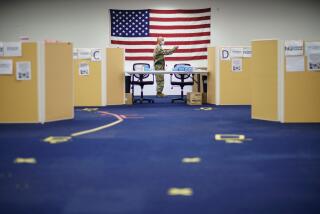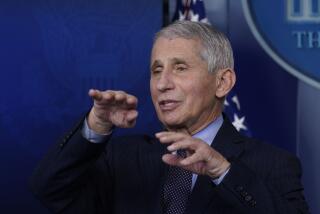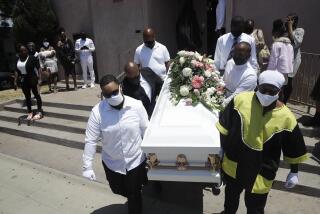Coronavirus scythes across U.S. as cases top 200,000
- Share via
WASHINGTON — The United States hit a grim milestone Wednesday as confirmed coronavirus cases soared past 200,000, far more than any other country, adding intense pressure to overstretched hospitals still struggling to find necessary medical supplies and drawing new warnings that the worst is yet to come.
In a sign of the nation’s struggles, a Russian cargo plane landed in New York City carrying emergency medical supplies, including ventilators and protective gear. The State Department said President Trump had agreed to purchase the supplies in a March 30 phone call with Russian President Vladimir Putin.
“We are a generous and reliable contributor to crisis response and humanitarian action across the world, but we cannot do it alone,” State Department spokeswoman Morgan Ortagus said. The Trump administration also has accepted supplies from China.
On a day the U.S. death toll topped 5,100, Trump said he was considering restrictions on domestic flights and train travel to and from “hot spots” with major outbreaks, although he acknowledged he was reluctant to add to the economic carnage by grounding aircraft.
“We’re certainly looking at it,” he said at the White House. “Once you do that, you’re certainly clamping down an industry that’s desperately needed.”
Trump has resisted growing calls to issue a national stay-at-home order, instead extending national guidelines on social distancing and limiting public gatherings until April 30.
But about 40 governors and numerous mayors have ordered more stringent restrictions to slow the spread of the virus, requiring more than 80% of Americans to stay at home except to buy groceries, seek medical care or perform other essential tasks.
One of the last major holdouts was Florida Gov. Ron DeSantis, who had faced mounting criticism for not doing more to protect the vulnerable elderly population in the nation’s third most populous state.
DeSantis, a Republican, relented Wednesday and announced a statewide stay-at-home order to replace restrictions in a few counties. DeSantis said that he changed his mind after speaking to Trump on the phone.
“When the president did the 30-day extension, to me, that was, people aren’t just going to go back to work,” DeSantis said at a news conference in Tallahassee, the state capital. “That’s a national pause button.”
Georgia, Mississippi and Pennsylvania also announced statewide stay-at-home orders, and California Gov. Gavin Newsom said other governors should adopt similar restrictions.
“What more evidence do you need?” he told CNN. “You’ll never regret overcompensating.”
The pandemic has circled the globe after originating in China, and the World Health Organization predicted the number of infections would soon surpass 1 million. Roughly 47,000 people have died around the world, according to data from Johns Hopkins University.
“We have witnessed a near exponential growth in the number of new cases, reaching almost every country, territory and area,” Tedros Adhanom Ghebreyesus, the WHO director-general, told reporters in Geneva.
The White House has projected between 100,000 and 240,000 deaths across the United States in coming weeks and months — assuming the country stays largely shut down for at least the next month.
“Difficult days are ahead for our nation,” Trump said. “We are going to have a couple of weeks, starting pretty much now, but especially a few days from now, that are going to be horrific.”
In cities like New York, New Orleans, Detroit and elsewhere, hospitals already are buckling from the increasing number of infections.
Trump confirmed that a national stockpile of personal protective equipment for medical personnel, such as gloves, masks and gowns, has been largely depleted. But he said that more supplies were being shipped directly to hospitals.
The pandemic has forced millions out of work, and closed millions of shops and businesses. New forecasts suggest the economic fallout could surpass the damage from the Great Recession that followed the financial crisis in 2008.
But it’s unclear how, or whether, the Trump administration will help people find health insurance.
Administration officials have declined to reopen the Affordable Care Act exchanges to purchase coverage, and Vice President Mike Pence, who heads the White House coronavirus task force, tried to dodge the question when pressed by a Fox News reporter at Wednesday’s news conference.
His evasions were tortured enough to draw a joke from Trump.
“Mike was able to speak for five minutes and not even touch your question,” he said.
Congress last week approved a roughly $2-trillion economic rescue plan to help stricken companies and families, and another stimulus package is possible this year to help create jobs after the nation reopens.
Rep. Adam B. Schiff (D-Burbank), chairman of the House Intelligence Committee, said Congress also should create a nonpartisan commission — similar to the 9/11 commission — to study whether the federal government was adequately prepared, and whether the administration should have acted earlier to stem the contagion.
“Given the severity of this crisis to our health, our economy, our national security, we ought to do an after-action analysis of what went wrong,” Schiff told The Times. “It would analyze our nation’s preparedness of pandemic — what we learned with this particular virus, the steps that we took, what mistakes were made and how we can better protect our country in the future.”
Times staff writers Tracy Wilkinson and Jennifer Haberkorn contributed to this report.
More to Read
Get the L.A. Times Politics newsletter
Deeply reported insights into legislation, politics and policy from Sacramento, Washington and beyond. In your inbox three times per week.
You may occasionally receive promotional content from the Los Angeles Times.











